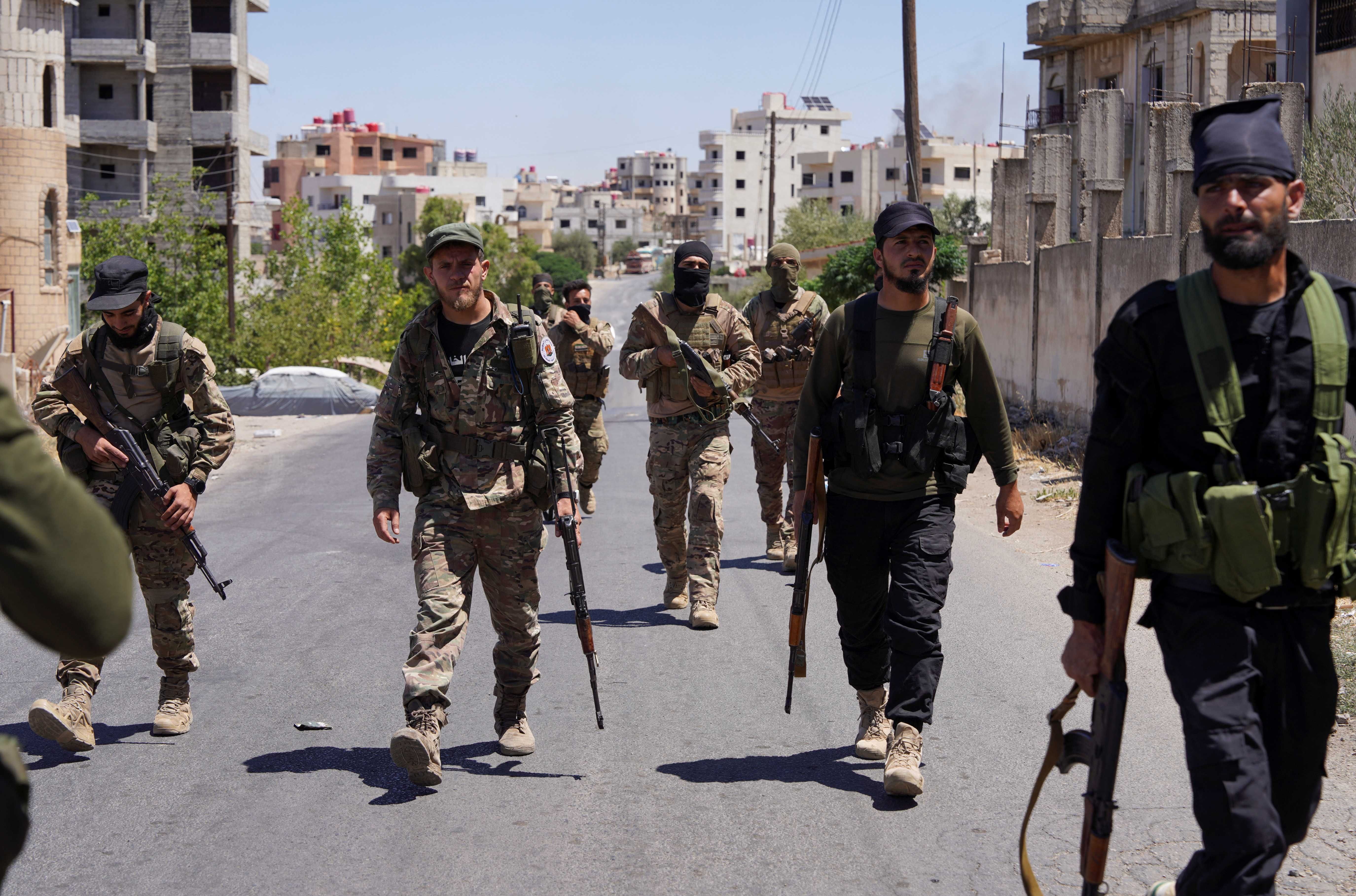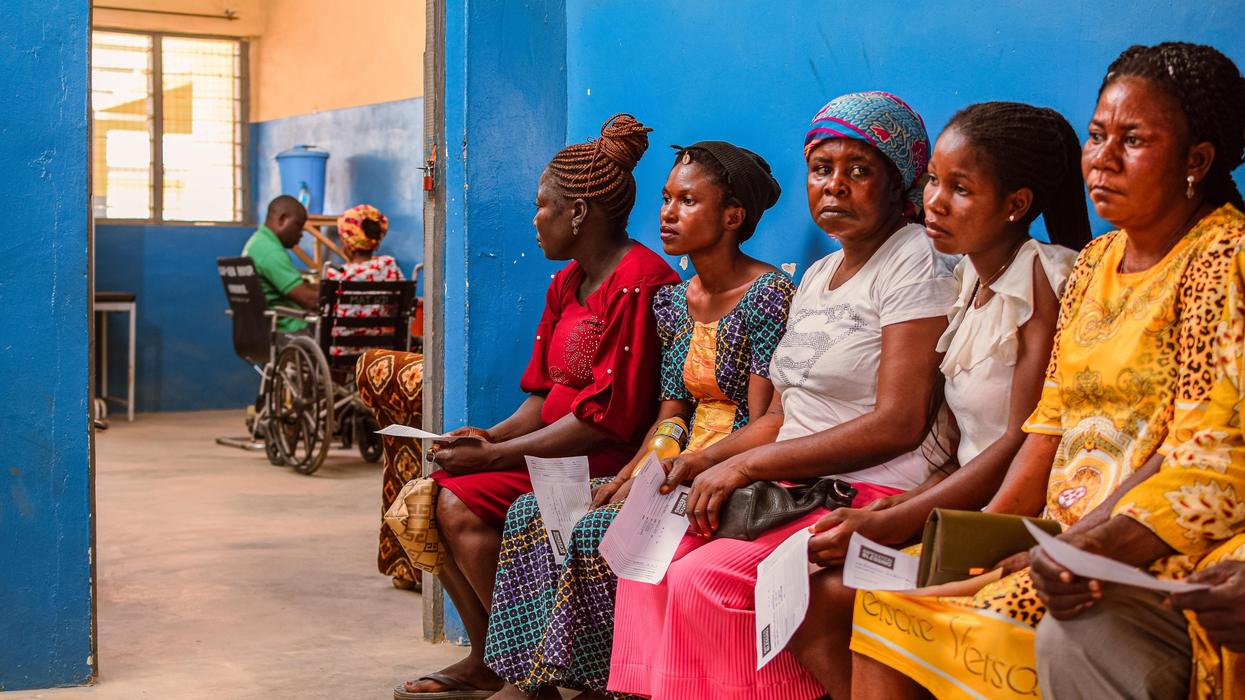In March of this year, Laya’s world came crashing down.
Following a series of skirmishes in the coastal region of Syria, the country’s transitional government had mobilized forces to put down what it saw as a brewing rebellion among Alawites, a minority offshoot of Shia Islam and the religion of former President Bashar al-Assad. The operation quickly turned into a bloodbath.
Government-affiliated militants and non-state actors swept through coastal towns, going door to door and killing any Alawite men they could find. Hundreds of bodies were dumped in the sea or in mass graves. “They killed my cousin,” recalled Laya, who lost several relatives in the attacks. “They came to his door and killed him there, in front of his wife and children.” His family survived but was too afraid to go outside in order to bury him. “His body remained in the house for four days,” Laya told RS, adding that “there are mothers who lost four or five children” in the killings.
After four days of massacres, Syrian President Ahmed al-Sharaa put a stop to the brutality carried out by his loosely organized forces. But not before at least 1,400 civilians, including roughly 100 women and children, were killed, according to a United Nations investigation. (Laya, who has worked to gather testimonies of the attacks, believes that the real number is much higher.)
Today, Laya and many of her fellow Alawites have resigned themselves to staying holed up in their homes, fearful of harassment or violence that they could face outside. “I left my work because I'm afraid to come and go from the house at the same time [every day],” she said. “I could be kidnapped.”
Ten months after the fall of the Assad regime, sectarian and ethnic tensions have come to represent a ticking time bomb at the heart of the new Syria. Sharaa may publicly call for creating a “Syria for all Syrians,” but minority groups, which represent roughly 35% of Syria’s population, remain unconvinced. While 81% of Sunnis believe the new government represents their interests, only 23% of respondents from minority religions can say the same, according to a recent poll.
Many of these problems were to be expected. During the brutal 14-year civil war, the Assad regime often inflamed sectarian divisions in order to bolster support for it among minority groups. But the new government has exacerbated these tensions by refusing to pursue a serious process of transitional justice, in which people are held accountable for atrocities related to the civil war, according to experts and regular Syrians who spoke with RS.
“The majority don't see justice being carried out because it's not being processed in a formal way,” said Joshua Landis, a non-resident fellow at the Quincy Institute and professor at the University of Oklahoma. The result is an escalating cycle of violence. Vigilantes and militants harass or kill people over alleged support for the Assad regime, then members of aggrieved minority groups strike back, leading to further reprisals. The open wounds of the civil war continue to fester.
So far, the U.S. has largely ignored this cycle of violence. Rather than pressing Sharaa to pursue transitional justice, American officials have set the question aside in order to focus on economic questions, according to Landis. But without foreign pressure, Sharaa is unlikely to do much more to heal the wounds of the civil war. And without steps toward reconciliation, fighting could return at any moment.
A State Department official told RS in a statement that the U.S. is pushing for the protection of all groups in Syria. "We support Syria’s national unity and a peaceful and inclusive integration of all its constituents, including religious and ethnic minorities," the official said. "We continue to call on the Syrian government to hold all perpetrators of violence accountable for their actions."
Signs of trouble have already started to appear in the northwest, where some Alawites are attempting to launch an insurgency. Anti-government militants remain weak, but they may not stay that way for long. “The Alawites can maybe endure for a year or two, but in the end, oppressed people can't remain unarmed,” Laya told RS.
An 'existential threat'
Transitional justice in Syria was never going to be easy. More than 600,000 Syrians died during the 14-year-long civil war, and at least 6 million of the country’s 22 million people fled the country and became refugees. Atrocities were commonplace, from the barrel bombings and chemical weapons attacks perpetrated by the Assad regime to the mass killings and public executions carried out by ISIS and other jihadist groups.
In May, Sharaa’s government announced efforts to pursue justice for crimes committed by the Assad regime, and authorities arrested at least 600 former officials on accusations of war crimes. But Damascus has largely kept this process out of the public eye, and it has shown no interest in investigating crimes committed by militants, according to Radwan Ziadeh, the chairman of a leading Syrian news channel and a prominent expert on transitional justice. “What concerns me the most is that this file is not a priority for the current government,” Ziadeh said, adding that Sharaa’s transitional justice commission has “zero experience” in the field. (Note: This reporter briefly worked for Ziadeh as an intern at the Arab Center in 2019.)
Sharaa has also attempted to strike a difficult balance with Syrian business leaders, many of whom built their empires on corruption and favors from the Assad regime. In order to raise funds, the new government has allegedly offered amnesty to some of these tycoons in exchange for large portions of their ill-gotten assets, sparking controversy among many in Syria, who want to see Assad allies punished for their crimes.
In the absence of visible transitional justice, some have attempted to take matters into their own hands. Revenge attacks against former regime officials have become commonplace, and the government remains unwilling or unable to stop them. Misinformation campaigns have made matters worse, as some viral posts scare minorities with false stories of sectarian attacks and others inflame anger at minorities with lurid stories of anti-Islamic acts.
More challenging yet has been the question of violations committed after the fall of the regime, like the massacres of Alawites in March. Many Syrians now view Alawites as an internal enemy. Assad’s military and government employed a disproportionate number of Alawites, some of whom contributed to the regime’s horrific human rights violations, including the torture and killing of thousands of prisoners both before and during the civil war. Many Alawites at least tacitly supported the government during the war, in part due to their fear of jihadist groups fighting on the other side.
When the regime fell, the Alawites were left exposed, with no domestic or international backer to protect them. As tensions with authorities grew, some Assad loyalists launched attacks on forces associated with Sharaa’s government, which helped spark the crackdown that descended into massacres in March. “Alawite civilians who had nothing to do with the Assad regime paid the price of others because Assad used the Alawites as a way of governing Syria,” Ziadeh told RS.
Under Ziadeh’s recommendation, Sharaa launched a commission to investigate the attacks, which led to the arrest of 232 people, according to Ziadeh, who described the commission’s report as “fantastic.” But many Alawites feel that these efforts didn’t go far enough.
Further complicating the transition has been the government’s uneasy relationship with the Druze, followers of an esoteric Abrahamic faith with a sizable population in southern Syria. Tensions had grown in the months following the fall of the Assad regime as Israel crossed into Syria and took up positions in Druze-majority regions, where some local leaders welcomed Israeli troops.
In July, clashes erupted in which government-affiliated militants and local Bedouin groups fought Druze militants, resulting in the deaths of at least 539 civilians. Israel joined the fray, launching airstrikes against the Syrian Ministry of Defense building in Damascus. The government attempted to impose a ceasefire, but a local notable named Hekmat al-Hijri rejected it, leading to a standoff that continues today. Many Druze who previously opposed Hijri now back him because of what they see as an “existential threat” from Damascus, according to Nanar Hawach of the International Crisis Group.
These fatal skirmishes have also factored heavily into the thinking of Syria’s Kurds, who lead the government in the country’s northeast under the banner of the Syrian Democratic Forces. SDF leader Mazloum Abdi has engaged in protracted negotiations with Sharaa’s government aimed at incorporating the northeast and the SDF’s military into the Syrian state. But fears of reprisals against Kurds — and a hunch that the Sharaa government could lose control at any moment — have led Abdi to slow roll the implementation of any plans.
But Sharaa isn’t the only one dealing with a restive population. The SDF rules over a territory in which Kurds are vastly outnumbered by Sunni Arabs, many of whom are anxious to bring their region under the control of Damascus. If Abdi continues to drag his feet, he could face uprisings of his own, according to Ziadeh. “If they continue to go this way I'm actually concerned [about the possibility of] political and maybe social unrest there,” he told RS.
Washington’s Goldilocks option
The Trump administration has played a major, if somewhat controversial, role in Syria’s transition. On the positive side, U.S. envoy Tom Barrack has helped to mediate talks between Damascus and the SDF while also throwing his support behind efforts to lift U.S. sanctions, which continue to strangle Syria’s economy.
But many experts fear that Barrack is ignoring the concerns of Syria’s minorities — an omission that could help exacerbate cycles of violence in the country. Analysts are also worried about Sharaa’s decision to fire all of the soldiers and officers from Assad’s army, leaving some 500,000 trained fighters, most of whom are Alawites, without jobs or life prospects. After all, when the U.S. implemented a similar policy in Iraq, it helped lead to the rise of ISIS.
“The international community at large, and the U.S. specifically, are incredibly well positioned to nudge Damascus to take bold steps,” Hawach said, noting the Syrian government’s strong desire for Western support. Hawach argues that U.S. leaders should urge Damascus to pursue accountability for atrocities and reform security institutions to better protect minorities.
Barrack has also sparked controversy by rejecting calls for some level of federalism in Syria. "As Ambassador and Special Envoy Barrack has affirmed, a unified Syria under 'one army, one government, one state' is pivotal to national and regional stability," a State Department official told RS. On this point, he has the support of many within the country. “A federal system based on ethnicity or religious sectarian lines is a recipe for civil war,” Ziadeh said, adding that he supports “administrative” decentralization but would otherwise want a strong central government.
But many minorities fear that a centralized system will leave them vulnerable to discrimination by the government in Damascus. In order to balance these interests, Steven Simon and Adam Weinstein of the Quincy Institute have suggested a Goldilocks solution. “The United States would be wise to stop rejecting federalism and encourage the transfer of some power to local or regional authorities,” Simon and Weinstein wrote in Foreign Affairs, cautioning that key issues like “monetary policy, foreign relations, and defense of Syria’s borders should remain with the central government.”
Such an approach could help push the new government toward a stable transition despite the concerns of minorities. “Ultimately, Syrians will determine their own system of government, and that is how it should be,” Simon and Weinstein wrote. “Yet the Trump administration must recognize the weight of its words and ensure that it is not inadvertently encouraging the interim government’s worst inclinations.”
- 'Syria for Syrians' is a lesson al-Sharaa can now use, or abuse ›
- Syria's new leader sheds terror past at UN ›
















